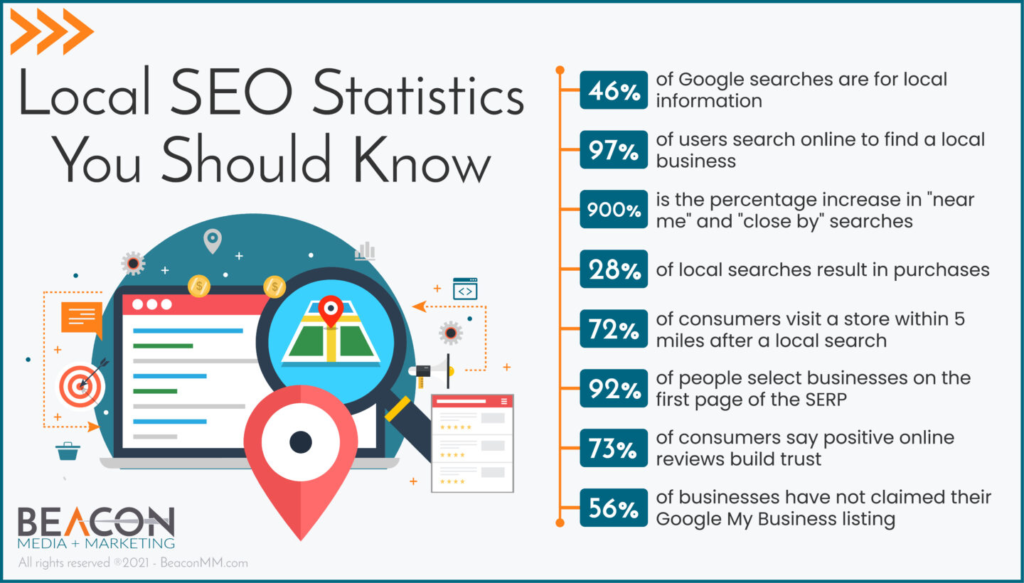Are you knee-deep in the perilous ocean of Search Engine Optimization (SEO), wrestling with Google’s algorithmic krakens, and you’ve suddenly found yourself pondering “How many pages should a website have for SEO?”
Oh, we hear you, and so does your sleep-deprived webmaster!
In this digital rat race where everyone is madly scurrying to impress search engine bots, we often overlook a fundamental question: what’s the ideal number of website pages for SEO?
If you’re expecting a cookie-cutter answer, like a divine revelation of ’42’, we’re sorry to break it to you; SEO doesn’t work that way (unless it’s Hitchhiker’s Guide to the SEO Galaxy).
But fret not, we’re here to guide you through this labyrinth.
This article will guide you through SEO decision making and the important processes of SEO that our pay monthly website packages utilize.
How Many Pages Should a Website Have for SEO? The key areas:
When it comes to determining the number of website pages, it’s not a numbers game. Instead, it’s about:
Content Relevance
If your content is as bland as a cardboard sandwich, no amount of webpages will save your SEO.
The foundation stone of an SEO-friendly website is high-quality, relevant content.
It’s about determining the depth and breadth of content, tailoring it to fit your audience’s needs, and then spicing it up with optimized keywords like it’s an exotic SEO curry.
User Experience (UX)
Google is simple really. It loves when users are happy, engaged, and satisfied.
So, make sure your website is structured like a well-planned city, not a chaotic bazaar, with easy navigation, comprehensive information, and a touch of hospitality.
Target Audience and Industry
In this grand digital banquet, you have to satiate the palate of your target audience.
Factor in their tastes, the competition’s menu (i.e., industry standards), and then cook up a content feast.
Just remember, it’s not about stuffing them with an excess of pages, but about quality and flavour.
The Case for a Fewer Number of Pages
“But wait!” you may be wondering, “Doesn’t more content mean more chances of ranking?” Not exactly, if you’re spawning content like a runaway photocopier. How many pages your website should have for SEO depends on the quality and depth of your content too!
Avoiding Thin or Duplicate Content

Nobody wants a single strand of spaghetti.
Google detests lazy content duplication and thin content as much as you hate unsolicited spam emails.
These can negatively impact your SEO rankings.
Focus on crafting unique, substantial content and strategically consolidating your pages to pack a punch.
Focusing on Core Pages
By prioritizing your core pages, you streamline user navigation and enhance your page authority, like focusing on the main plot points in a riveting novel.
And trust us, no one likes an author who beats around the bush.
The Case for a Larger Number of Pages
On the flip side, having a larger number of pages is like having more arrows in your quiver, but only if they’re sharp and well-targeted.
Expanding Keyword Opportunities
With more pages, you can target a larger spread of long-tail keywords, cover more topics, and create content clusters.
It’s a bit like hosting a large party where each guest feels personally welcomed.
Maximizing Organic Search Visibility
More high-quality pages increase your odds of ranking for a variety of search queries, broadening your website’s reach and aligning it with user and search intent.
But remember, this isn’t a wild bet at a casino; it requires thoughtful strategy.
Striking a Balance: Determining the Optimal Number of Pages
So, what’s the magic number? It’s not a magic number but a thoughtful evaluation of your website’s goals, desired outcomes, and content audit.
Analyzing Website Goals and Objectives
Your website isn’t a vanity project. Define its purpose, identify desired outcomes, and align your pages accordingly.
Conducting a Comprehensive Content Audit
Review your existing content, identify gaps, and either trim the fat or flesh out your content skeleton accordingly.
The Role of Social Media in SEO
Despite what some naysayers might claim, social media does matter in SEO, even if it’s like that distant cousin who always shows up uninvited at family gatherings. Here’s how:
Social Sharing and Link Building
Every retweet, share, and like is an opportunity for new audiences to discover your content, potentially leading to more inbound links – it’s like the world’s most chaotic word-of-mouth marketing campaign.
Boosting Brand Awareness
With the right social media strategy, you could become as recognizable as a coffee shop logo.
More brand recognition often leads to more branded searches on Google, which is a good look in the eyes of our algorithmic overlords.
Best Practices for SEO-Friendly Websites
All this doesn’t matter if you overlook the fundamental SEO practices. If you need a more in-depth look at the process of a healthy website, check out comprehensive expert website overview.
Optimizing Metadata and On-Page Elements
SEO is also about the backstage work – optimizing title tags, meta descriptions, header tags, URL structure, internal links, image alt tags, and schema markups.
Like a stage play, it’s not just the performance but also the production that matters.
Mobile-Friendly Design and Page Speed
Responsive design and quick loading times are as critical as the content itself.
Google’s love for mobile-friendly design is no secret, and let’s be honest, who likes waiting?
Technical SEO
This is like the plumbing and wiring in your house – you don’t see it, but it’s vital.
Ensure your website is easily crawlable, with a well-structured sitemap, effective robots.txt file, and secure, HTTPS protocol.
User Engagement
Keep an eye on metrics like bounce rate and time spent on page. Engage your audience with interactive elements and compelling CTAs (just don’t overdo it, or your website might start looking like a circus).
Local SEO
If you’re a local business, don’t overlook the importance of local SEO. Optimize for local keywords, set up your Google My Business, and collect those golden reviews.

The Impact of Regular Content Updates
Updating your website regularly is like feeding a pet; it keeps your site healthy, happy, and seen by Google’s wandering eye.
Fresh Content Attracts Crawlers
Search engines are like honey bees, attracted to fresh, nectar-rich content. Regular updates give them a reason to visit, increasing your visibility chances.
Meeting Evolving User Needs
Your audience’s needs aren’t static – they evolve, like fashion trends.
Regularly updating your content keeps it relevant and valuable, helping you maintain a strong SEO position, even when bell-bottoms come back in style (again).
Conclusion
In the end, the optimal number of pages for your website is as subjective as the perfect number of olives in a martini.
It’s about finding a balance between quality and quantity, a delicate dance with SEO at its heart.
Just remember, in the grand scheme of SEO, it’s less about the number of pages and more about what you do with them.
So, go forth, take this wisdom and apply it to your website.
And remember, the only magic number in SEO is the number of coffees you’ll need to stay awake while you optimize. Cheers!
FAQs
Is more content better for SEO?
Quality over quantity is the key. Having more content can provide more opportunities to rank, but only if it’s high-quality, relevant, and adds value to your audience. No one likes a chatterbox that has nothing meaningful to say.
Does website size affect SEO?
A larger website with more pages can potentially rank for more keywords, but this also depends on the quality of content, site architecture, and a myriad of other factors. Size isn’t everything – just ask a T-Rex.
How often should I update my website for SEO?
There’s no one-size-fits-all answer. It depends on your audience, industry, and the type of content. Just remember, freshness is important, but so is relevancy. And no, changing a comma to a semicolon every other week doesn’t count.
How does social media impact SEO?
While social media may not directly influence your SEO, it can help increase brand visibility, drive traffic to your website, and enhance your link building efforts. It’s like a sidekick that indirectly helps the superhero.
Do website pages need to be a certain length for SEO?
Longer content tends to rank well as it often provides in-depth information. However, the key is relevancy and value. If you can thoroughly answer a user’s query in 300 words, no need to fluff it up to a 3000-word dissertation.



2 thoughts on “How Many Pages Should a Website Have for SEO? The Goldilocks Conundrum”
Comments are closed.